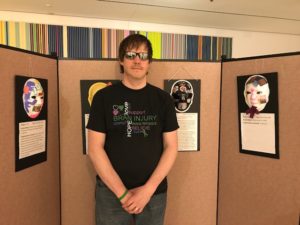Annual art show features the artistic talents of individuals with brain injury from Monday, April 24 through Friday, April 28, in the South Concourse of the Empire State Plaza.
The show features large-scale Unmasking Brain Injury Display
ALBANY, NY: April 24, 2017 – The Brain Injury Association of New York State (BIANYS) announced today the return of their annual art show in Albany. For the 24th consecutive year, BIANYS will showcase the artistic talents of nearly 50 individuals with brain injury from Monday, April 24 through Friday, April 28, in the South Concourse of the Empire State Plaza.
An estimated 2.8 million Americans currently live with disabilities resulting from brain injury. Brain injury profoundly effects individuals’ physical and cognitive abilities and makes it extremely difficult or impossible for individuals to live full productive lives. For many, artistic expression is a way back; a way to reclaim their lives and sense of self-worth following their injury.
“The Brain Injury Association of New York State is honored to once again provide a creative outlet where dozens of individuals have the opportunity to showcase their work,” said Eileen Reardon, Executive Director for BIANYS. “Annually, the art show illustrates the strength, perseverance and talent of individuals impacted by brain injury and their individual journey of recovery. The art show provides a glimpse of these personal stories and is an inspiration for everyone who experiences it.”
The exhibit encompasses a wide variety of art displays and features a large-scale Unmasking Brain Injury display. Unmasking Brain Injury art is uniquely designed by individuals with brain injuries and promotes awareness of the prevalence of brain injury and gives survivors a voice and the means to educate others of what it’s like to live with a brain injury.
###
About Unmasking Brain Injury
The mission of Unmasking Brain Injury is to promote awareness of the prevalence of brain injury; to give survivors a voice and the means to educate others of what it’s like to live with a brain injury; to show others that persons living with a disability due to their brain injury are like anyone else, deserving of dignity, respect, compassion and the opportunity to prove their value as citizens in their respective communities.

